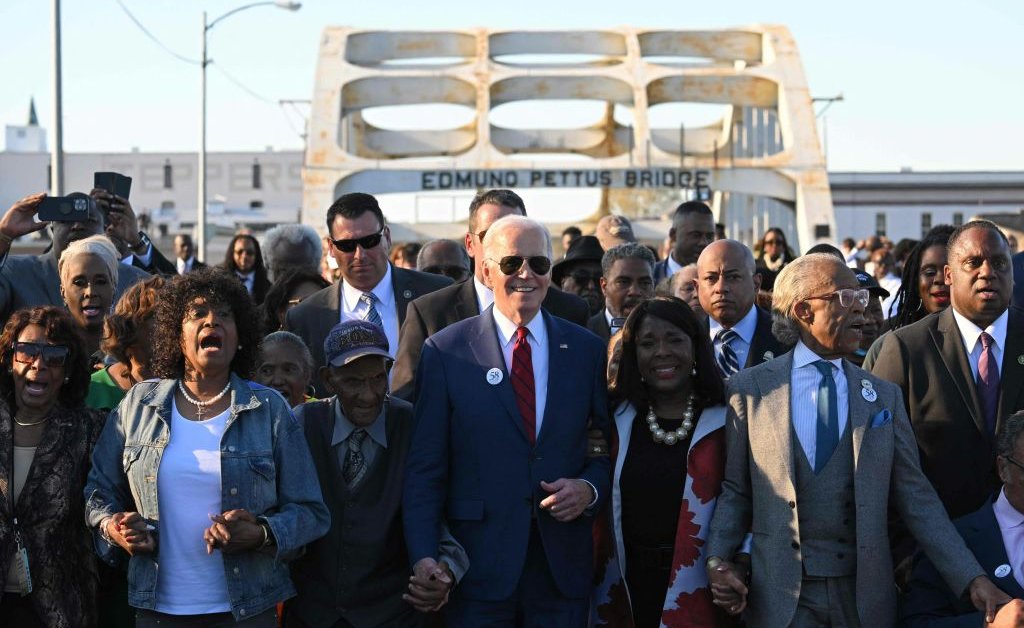
This article is part of The D.C. Brief, TIME’s politics newsletter. Sign up here to get stories like this sent to your inbox.
Plenty of ink has been spent linking Joe Biden’s win in 2020 with Black voters. It’s no exaggeration to credit his nomination to a unified Black electorate in South Carolina’s primary, thanks in no small measure to the clout of Rep. Jim Clyburn’s endorsement in a state where more than half of Democratic turnout was Black. The throughline continues to that November, when Biden’s win over Donald Trump came thanks to that slice of voters who remained loyal to the former Vice President—and deeply hostile to the man he was facing. If he wins again next year, Biden’s final act in public life could be the surest flex of Black political power in decades.
But, quietly, there have been some rumblings inside Democratic circles that Biden needs to do more to shore up his position with Black voters. While polls show almost half of all Democrats would prefer he hang up his Air Force One bomber jacket after one term, his support remains far stronger among Black voters. And yet, even that number may be going ever so wobbly. We are talking about movement on the fringes of a mainstay of Democratic politics, for sure, but recent elections have shown that even the slightest gradation matters. Biden’s favorability ratings among Black voters have shifted from 84% right after he took office in 2021 to 74% at the end of March 2023, according to YouGov/Economist polling. (That’s still better than Biden’s 46% favorable rating at the start of his term among white voters, which has since slipped to 40%.) Outside super PACs and friendly-to-Biden organizations have also picked up on these blips, both in polling and in focus groups in battleground states and are starting to figure out how to connect with Black voters.
Historically, to be candid, Republicans have done themselves no favors in pursuing or persuading Black voters, and there are few reasons to think that is going to be quick to change. No, not even Sen. Tim Scott’s announcement on Wednesday that he would form a presidential exploratory committee—a tangible step that allows the lone Black Republican in the Senate to raise and spend money for an eventual White House campaign—is likely to change the macro trends there. The Republican Party’s longstanding opposition to a voting rights bill in Congress and their years of antipathy toward and obstruction of Barack Obama are tough to shake. Some Republicans have aligned themselves with Christian nationalists and groups with links to white supremacy. That all makes for a challenging recruiting pitch to Black voters, even if Scott on his own is a charismatic and compelling figure.
Trump remains the nominal candidate to beat for the GOP nomination, and his comparable poll numbers show a deeply unpopular figure among Black voters; his unfavorable number fell to 60% at the end of last month in the YouGov/Economist poll, down from the 93% mark he posted during the summer of 2020. Still, with Biden’s standing among Black voters on ground more like Hillary Clinton’s in 2016 than Biden’s in 2020, it’s worth taking a beat to look at the hard numbers, and consider why.
First, a little history. Since exit polls became part of Election Day data dumps in 1972, no Republican has fared better with Black voters than Richard Nixon, who managed 18% in his ‘72 re-election campaign. No Democrat has captured their party’s nomination without the Black vote since 1992. (Sen. Edward M. Kennedy carried the Black vote in 1980 with 44% of the vote but missed the nomination, and the Rev. Jesse Jackson dominated that bloc during his 1984 and 1988 campaigns.) Put plainly: you can’t win the nomination or the White House as a Democrat without the Black vote.
Biden, facing no serious primary challenges at the moment, is expected to fall nicely into the historical patterns, but the general election might be a different story. Clinton in 2016 carried 88% of the Black vote, a slight swing from four years earlier when the country re-elected its first Black President with 93% of the Black vote. Still, those Black voters were relatively meh when it came to Clinton’s candidacy; Trump didn’t seem quite so bad and had a certain novelty about him. When Biden ran as the nominee in 2020, he carried 87% of the Black vote, according to exit polls, and that was when voters faced a choice whether they wanted another four years of Trump. And, in last year’s midterm elections, Democrats drew the support of 86% of the Black vote.
If all of this sounds statistically negligible, it is. Polling is of course imprecise; a margin of error is built into every survey, after all. And yet, it’s worth remembering that Trump prevailed in 2016 by besting Clinton by about 80,000 votes in just three states. If all holds steady, Biden could well end up in a rematch against Trump, who saw his support among Black voters climb from 8% in 2016 to 12% four years later. That shift wasn’t enough to deny Biden a gig he’s been chasing since his 20s, but it didn’t happen by accident.
Biden’s record on race at this point is decidedly up for debate, too. He made good on his campaign promises to pick a Black woman as a running rate and put one on the Supreme Court, and continues to this day to enjoy the political riches from those moves. But Biden’s efforts to get a comprehensive voting rights measure into law have come up short, his attempts to control gun violence are as stymied as they are frustrating, and it seems like every few weeks an unflattering story about Vice President Kamala Harris—the first woman and first woman of Black and Asian heritage in the job—seems to bandy around Biden’s chums. Go any deeper in Biden’s record and things get sticky.
Read more: How Biden’s Remarks About Police Violence Stack Up to His Actions
To be clear: Biden is expected to keep Black voters as a reliable part of his coalition, and they’re his insulation from an electorate that, despite its increasing diversity, is still about 70% white. But campaigns are decided in small microtrends, and, with roughly 13% of the electorate steadily reporting they are Black, these voters cannot be ignored, especially if their allegiance grows less intense. (Other studies put Black voters’ clout around 20%, well ahead of what exit polls report.)
Biden gets this all too well. It’s why we saw the President release images of his call last week with two Black lawmakers from Tennessee who were expelled for leading a protest against gun violence. It’s why so much of the White House and Cabinet-level travels have made outreach to Black communities part of their agenda. And it’s why, even as Biden continues to delay his actual entrance to the 2024 campaign, he has signaled to his advisers that they’ve got to keep hitting the mark on building a diverse and inclusive team around him. That commitment may be as sincere as any politician’s belief, but it also makes for good politics—and it’s been evident for decades that Biden seldom can count on good luck to be a lengthy visitor.
Make sense of what matters in Washington. Sign up for the D.C. Brief newsletter.
More Must-Reads From TIME














